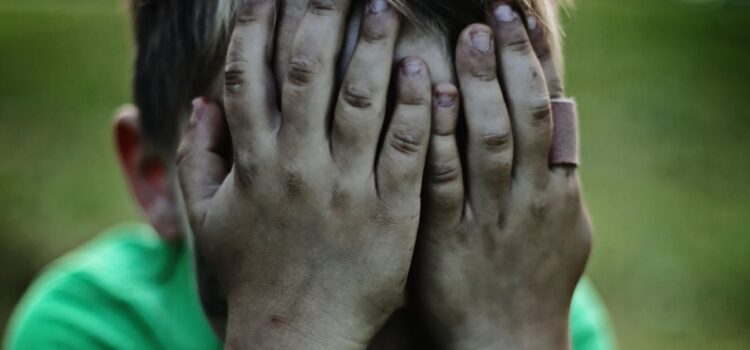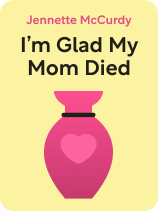

This article is an excerpt from the Shortform book guide to "I'm Glad My Mom Died" by Jennette McCurdy. Shortform has the world's best summaries and analyses of books you should be reading.
Like this article? Sign up for a free trial here.
How did Jennette McCurdy recover from her mother’s abuse? What are the effects of abusive parents on adult children?
After her mom’s death, McCurdy’s difficult childhood and its lasting, negative effects began to catch up to her. In I’m Glad My Mom Died, McCurdy explores her experience with therapy and treatment for her eating disorders and how she came to terms with her mom, Debra’s abuse.
Continue reading to learn how this former actor coped with her abusive childhood as an adult.
Therapy and Treatment for Eating Disorders
McCurdy begins going to a therapist and life coach, Laura to deal with the effects of her abusive parent. They start by taking stock of McCurdy’s life, determining that she’s binging and purging 5-10 times a day and drinking 8-9 shots of hard alcohol a night. Laura helps McCurdy understand that she’s binging and purging as a way to relieve anxiety caused by pent-up emotions. McCurdy is so spent and exhausted after she purges that she has no energy left for anxiety. In this way, the act serves as self-medication. She learns that one method of addressing her bulimia is by journaling constantly to get her feelings on paper so they aren’t unconsciously propelling her actions.
In response to Laura’s questions, McCurdy reveals that her mom showed her how to restrict calories when she was 11. Laura says that McCurdy’s mom taught her how to be anorexic and encouraged her anorexia; she says this was abuse. McCurdy has always told herself that her mom wanted what was best for her, and she can’t stomach hearing her mom be called abusive. She quits therapy and returns to her disordered eating with a vengeance.
Soon after McCurdy leaves therapy, her dad tells her that he’s not her biological father. Then, her boyfriend, who’s suddenly become religious despite previously showing no interest in religion, declares that he’s Jesus Christ reincarnated. McCurdy feels as if nothing in her life is certain or under her control. On a flight to Australia for a press junket, she binges and purges the entire time, and the last time, she loses a tooth in the process—her stomach acids had worn down the enamel. When she lands, she finds out her boyfriend is in a mental health facility and may be schizophrenic.
Things have gotten so bad that she decides to see an eating disorder specialist, Jeff. He starts by having her eliminate any “dieting” behavior: She must get rid of all diet foods in her house and stop exercising, except for walking and stretching. Then she needs to track her eating and purging. Next, he has her attempt to eat three meals a day, with snacks in between. She starts making gradual progress.
One lesson she learns that hits home for her is the difference between a “slip” and a “slide.” A slip is when you slip up on your road to recovery and return to the behavior you’re trying to quit. You may feel guilt or frustration, which is normal and can even motivate you to change. A slide is when you add shame to those feelings of guilt and frustration, beating yourself up or telling yourself you’re a terrible person because you made a mistake. The problem with shame is it tends to spiral, often leading you to slip up more and more. Accepting that you’ll make mistakes on the road to recovery, without going into a “shame spiral” every time you do, can in fact make recovery more likely.
McCurdy struggles for years to recover from her eating disorder and has frequent relapses. However, using the techniques she’s learned, McCurdy eventually reaches a point where she’s able to go a year without purging, and she begins to enjoy eating.
Coming to Terms With Debra’s Abuse
McCurdy visits Debra’s grave regularly after she dies, but as the years pass, she visits less and less frequently. On one of her visits, McCurdy notes all of the superlative adjectives the family had placed on her gravestone and reflects on how she always believed her mom was all of these and more—a kind of goddess who could do no wrong. But now she recognizes the truth: Her mom was a narcissist who emotionally, mentally, and physically abused her.
McCurdy catalogs some of the ways that Debra hurt her:
- Debra gave McCurdy breast and vaginal exams until McCurdy was 17. McCurdy felt violated, but her mom had taught her that she didn’t have the option of saying “no” to anything her mom thought was best.
- When McCurdy was only 6, Debra forced her into a career that McCurdy didn’t want. She never had a chance to be a child.
- When McCurdy was 11, Debra taught her an eating disorder.
- Debra lied to her about who her father was, and never told her about her biological father.
Despite the abuse, McCurdy still misses her mom and reflects fondly on some aspects of her personality. Sometimes she imagines that if her mom were still alive, she would have apologized for her actions, and the two could have a healthy relationship.
But then McCurdy realizes that this is just a fantasy. She knows that her mom never acknowledged her issues or made any effort to change during her lifetime, even though her behavior was harming her family. McCurdy knows that if Debra were still alive, she’d still be trying to manipulate McCurdy into doing and being exactly what Debra wanted, she’d still be encouraging McCurdy’s eating disorder, and she’d still be pushing McCurdy to continue in an acting career that makes McCurdy miserable. McCurdy gets up from Debra’s grave and walks away, knowing that she’ll never come back.

———End of Preview———
Like what you just read? Read the rest of the world's best book summary and analysis of Jennette McCurdy's "I'm Glad My Mom Died" at Shortform.
Here's what you'll find in our full I'm Glad My Mom Died summary:
- Former child star Jennette McCurdy's autobiography
- McCurdy's difficult, often traumatic, relationship with her controlling mother
- What it's like to grow up as a child in the spotlight






